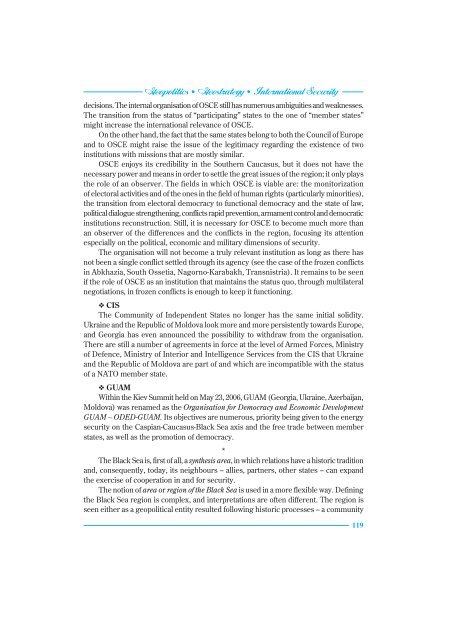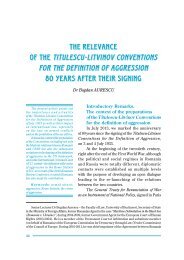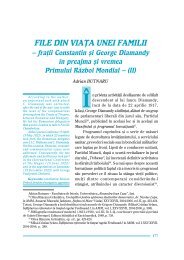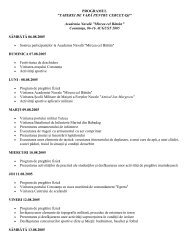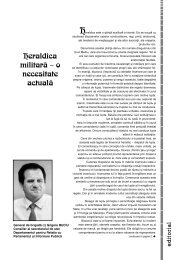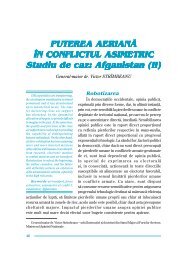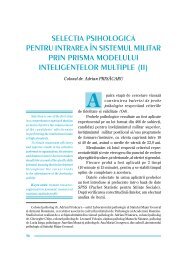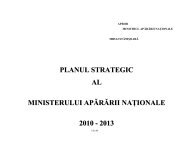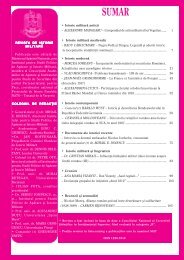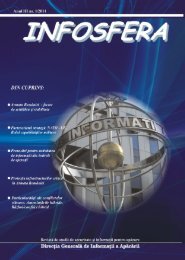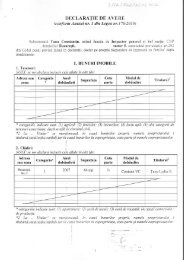Romanian Military Thinking
Romanian Military Thinking
Romanian Military Thinking
Create successful ePaper yourself
Turn your PDF publications into a flip-book with our unique Google optimized e-Paper software.
Geopolitics • Geostrategy • International Security<br />
decisions. The internal organisation of OSCE still has numerous ambiguities and weaknesses.<br />
The transition from the status of “participating” states to the one of “member states”<br />
might increase the international relevance of OSCE.<br />
On the other hand, the fact that the same states belong to both the Council of Europe<br />
and to OSCE might raise the issue of the legitimacy regarding the existence of two<br />
institutions with missions that are mostly similar.<br />
OSCE enjoys its credibility in the Southern Caucasus, but it does not have the<br />
necessary power and means in order to settle the great issues of the region; it only plays<br />
the role of an observer. The fields in which OSCE is viable are: the monitorization<br />
of electoral activities and of the ones in the field of human rights (particularly minorities),<br />
the transition from electoral democracy to functional democracy and the state of law,<br />
political dialogue strengthening, conflicts rapid prevention, armament control and democratic<br />
institutions reconstruction. Still, it is necessary for OSCE to become much more than<br />
an observer of the differences and the conflicts in the region, focusing its attention<br />
especially on the political, economic and military dimensions of security.<br />
The organisation will not become a truly relevant institution as long as there has<br />
not been a single conflict settled through its agency (see the case of the frozen conflicts<br />
in Abkhazia, South Ossetia, Nagorno-Karabakh, Transnistria). It remains to be seen<br />
if the role of OSCE as an institution that maintains the status quo, through multilateral<br />
negotiations, in frozen conflicts is enough to keep it functioning.<br />
CIS<br />
The Community of Independent States no longer has the same initial solidity.<br />
Ukraine and the Republic of Moldova look more and more persistently towards Europe,<br />
and Georgia has even announced the possibility to withdraw from the organisation.<br />
There are still a number of agreements in force at the level of Armed Forces, Ministry<br />
of Defence, Ministry of Interior and Intelligence Services from the CIS that Ukraine<br />
and the Republic of Moldova are part of and which are incompatible with the status<br />
of a NATO member state.<br />
GUAM<br />
Within the Kiev Summit held on May 23, 2006, GUAM (Georgia, Ukraine, Azerbaijan,<br />
Moldova) was renamed as the Organisation for Democracy and Economic Development<br />
GUAM ~ ODED-GUAM. Its objectives are numerous, priority being given to the energy<br />
security on the Caspian-Caucasus-Black Sea axis and the free trade between member<br />
states, as well as the promotion of democracy.<br />
*<br />
The Black Sea is, first of all, a synthesis area, in which relations have a historic tradition<br />
and, consequently, today, its neighbours – allies, partners, other states – can expand<br />
the exercise of cooperation in and for security.<br />
The notion of area or region of the Black Sea is used in a more flexible way. Defining<br />
the Black Sea region is complex, and interpretations are often different. The region is<br />
seen either as a geopolitical entity resulted following historic processes – a community<br />
119


